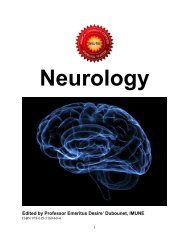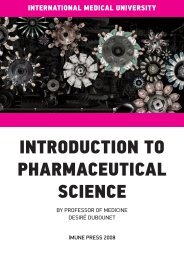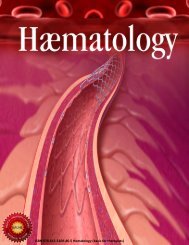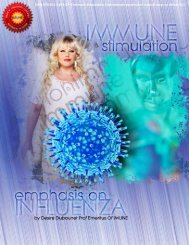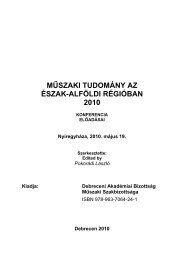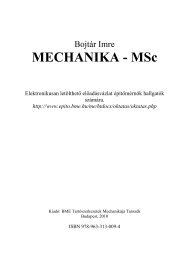You also want an ePaper? Increase the reach of your titles
YUMPU automatically turns print PDFs into web optimized ePapers that Google loves.
Prior to injection the dietary induced blood sugar was altered to three different levels; high blood<br />
sugar, normal blood sugar and lower blood sugar. After 70 days 66% of the high blood sugar group<br />
had died, 33% of the normal blood sugar had died and only 5% of the lowered blood sugar group<br />
had died. This demonstrates that the less sugar in our system the more cancer and pathogen<br />
protective we become.<br />
Remember this: Greater Toxic Load + Weakened Immune System (WBCs) = Disease (especially<br />
cancer).<br />
Your motto in detoxifying is, “Get the bad (toxins/chemicals) out of the system and get the good<br />
in,” such as nutrients, vitamins, minerals, enzymes, antioxidants and phytochemicals.<br />
A 12-ounce can of regular pop can reduce the ability of WBCs to eat bacteria by 40 percent for<br />
up to six hours. That means that if you drink pop and eat other sugars, your body’s defenses are<br />
down. If someone sneezes around you, or you rub your eyes or mouth with your hands, you’re<br />
highly susceptible to contract the bacteria or virus. Similarly, cancer starts to grow when WBCs are<br />
being suppressed with sugar, other dietary factors, stress, etc.<br />
2) Sugar depletes the body of valuable B vitamins.<br />
27 B vitamins are essential for many bodily functions, too many to list here. A vitamin B deficiency<br />
can cause many problems, including:<br />
• neurological disease<br />
• fatigue<br />
• pernicious anemia (red blood cells affected)<br />
• blood sugar problems<br />
• congestive heart failure<br />
• allergies<br />
• memory loss<br />
• depression<br />
• skin and tongue problems<br />
Whenever we strip our sugars and flours - the manufacturers call it “refining” - to make them<br />
white, we’re taking away what God gave them to be a balanced food. Whole wheat, for instance,<br />
has B vitamins together with the starches that break down into sugar, so we do not become<br />
deficient eating it. On the other hand, white bread, like white sugar, has been stripped of essential<br />
B vitamins, so the body in turn draws them from other places - like nerves - to metabolize the<br />
refined sugars that have been eaten.<br />
REFINING GRAINS<br />
Grains are energy powerhouses and have an abundance of vitamins, minerals, fiber, phytochemicals,<br />
enzymes and bioelectricity. Grains should primarily be eaten sprouted and alive or by making<br />
sprouted grain uncooked bread that is dehydrated at a temperature under 110 degrees Fahrenheit.<br />
Grains can also be grown into greens like wheat grass and barley grass and then juiced for even<br />
higher contents of all of the above, along with a high concentration of oxygen that they bring to<br />
your body because of the live chlorophyll.<br />
But how does the average American eat grains? They have been cooked, refined and processed to<br />
make refined breads and pasta. They have lost all their enzymes, bioelectricity, oxygen - the three<br />
most important elements in any food source, and nearly all their vitamin, mineral, phytochemical<br />
and fiber content. The manufacturers of these products then-to satisfy the consumer quest for<br />
trying to get enough vitamins and minerals- add back synthetic vitamins and inorganic minerals<br />
that at the very best are non-absorbable and at the very worst are toxic. You the unsuspecting<br />
consumer read the white or pseudo wheat bread package and it says “fortified” or “enriched”<br />
with 100 percent of the recommended daily allowance of all these vitamins and minerals and<br />
you think, “great, I am eating healthy bread.” In fact you are eating a sticky gluey clogging antinutrient<br />
that will cause not only a slow decline of your general health, but that will cause very<br />
specific respiratory and digestive and absorptive problems due to the wheat gluten that remains<br />
after processing.<br />
Here’s what happens during the refining and processing of a grain:<br />
• 90% of fiber is lost<br />
• 75-88% of trace minerals are lost<br />
• almost all vitamins are lost<br />
• 100% of enzymes are lost<br />
• 100% of bioelectrical charge is lost<br />
• 100% oxygen content is lost<br />
To make our bread and pasta look pretty, chlorine bleaches are added to make the flour nice and<br />
white - these toxic chemicals are carcinogenic. What you are left with is a potentially toxic antinutrient<br />
that gives you nothing but empty calories. What is an anti-nutrient? An anti-nutrient uses<br />
up your nutrients instead of giving you nutrients. An example is eating an English muffin versus<br />
eating a banana.<br />
1. 200 calorie English muffin needs three micrograms of chromium to be assimilated into the body.<br />
It only has one microgram, so the total comes up to 1-3 micrograms chromium = -2 micrograms or<br />
it takes away 2 micrograms of chromium form the chromium store in your body.<br />
2. 200 calorie banana has 150 micrograms of chromium. It needs 3 micrograms to be assimilated<br />
into the body so 150-3 micrograms chromium = 147 micrograms.<br />
This means the banana actually adds 147 micrograms of chromium to the body instead of taking<br />
away as the muffin did.<br />
All these reasons are why refined grains are not healthy, but actually slowly destroying our health.<br />
A general rule is the more food you eat in the way God created the food the better your health will<br />
be - uncooked and living is best. The best grains to eat are non-gluten, sprouted forms like quinoa,<br />
millet and amaranth. These grains rarely cause any allergy or sensitivity and were the staple diet<br />
of the Aztec and Inca empires. Quinoa has been called the “Supergrain” because of its being a<br />
complete protein having all the essential amino acids needed for human health.<br />
3) Sugar depletes the body of necessary minerals.<br />
When sugar depletes our supply of valuable minerals like calcium and magnesium, this can result<br />
in osteoporosis, arthritis and a host of mineral-deficient symptoms like:<br />
• leg cramps<br />
• muscle tightness or spasms<br />
• low blood sugar<br />
• diabetes<br />
• low blood pressure<br />
72 73



